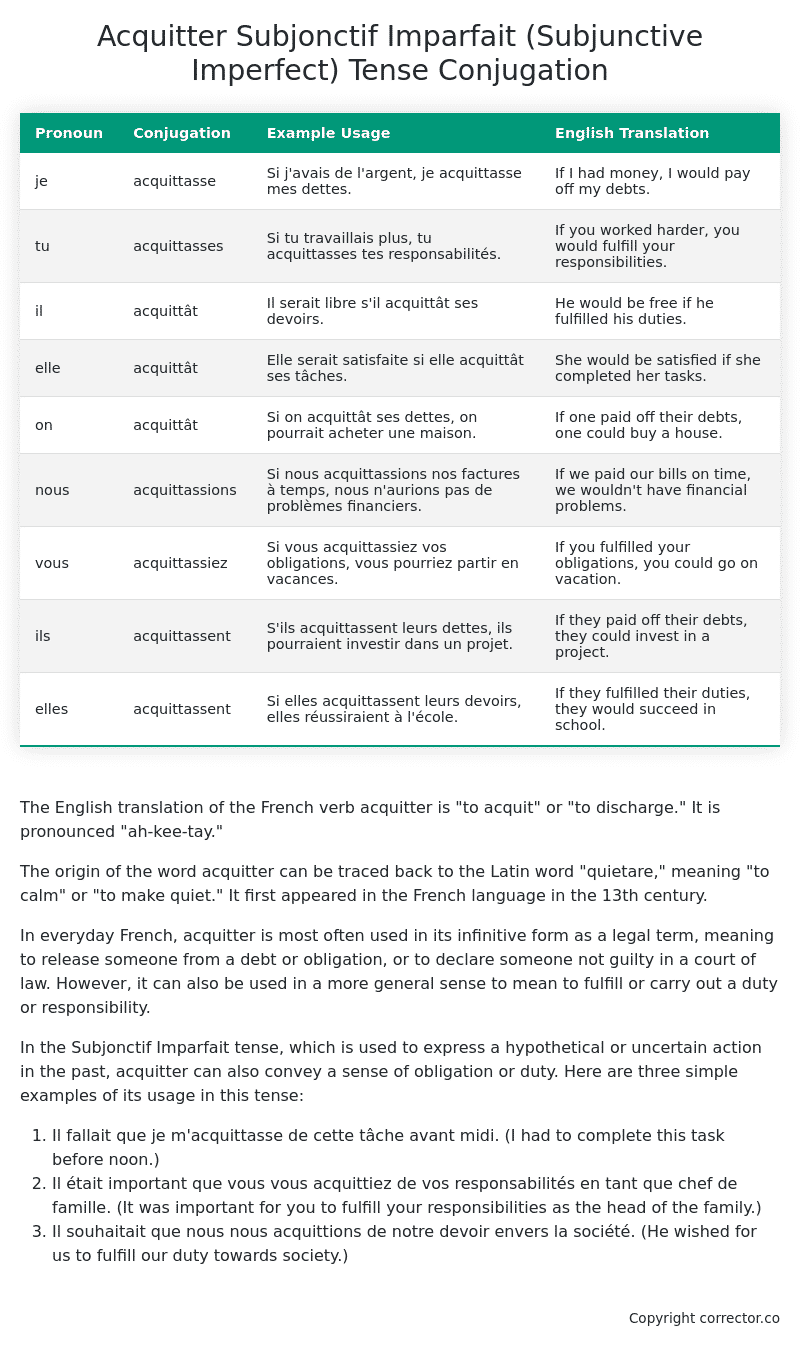Subjonctif Imparfait (Subjunctive Imperfect) Tense Conjugation of the French Verb acquitter
Introduction to the verb acquitter
The English translation of the French verb acquitter is “to acquit” or “to discharge.” It is pronounced “ah-kee-tay.”
The origin of the word acquitter can be traced back to the Latin word “quietare,” meaning “to calm” or “to make quiet.” It first appeared in the French language in the 13th century.
In everyday French, acquitter is most often used in its infinitive form as a legal term, meaning to release someone from a debt or obligation, or to declare someone not guilty in a court of law. However, it can also be used in a more general sense to mean to fulfill or carry out a duty or responsibility.
In the Subjonctif Imparfait tense, which is used to express a hypothetical or uncertain action in the past, acquitter can also convey a sense of obligation or duty. Here are three simple examples of its usage in this tense:
- Il fallait que je m’acquittasse de cette tâche avant midi. (I had to complete this task before noon.)
- Il était important que vous vous acquittiez de vos responsabilités en tant que chef de famille. (It was important for you to fulfill your responsibilities as the head of the family.)
- Il souhaitait que nous nous acquittions de notre devoir envers la société. (He wished for us to fulfill our duty towards society.)
Table of the Subjonctif Imparfait (Subjunctive Imperfect) Tense Conjugation of acquitter
| Pronoun | Conjugation | Example Usage | English Translation |
|---|---|---|---|
| je | acquittasse | Si j’avais de l’argent, je acquittasse mes dettes. | If I had money, I would pay off my debts. |
| tu | acquittasses | Si tu travaillais plus, tu acquittasses tes responsabilités. | If you worked harder, you would fulfill your responsibilities. |
| il | acquittât | Il serait libre s’il acquittât ses devoirs. | He would be free if he fulfilled his duties. |
| elle | acquittât | Elle serait satisfaite si elle acquittât ses tâches. | She would be satisfied if she completed her tasks. |
| on | acquittât | Si on acquittât ses dettes, on pourrait acheter une maison. | If one paid off their debts, one could buy a house. |
| nous | acquittassions | Si nous acquittassions nos factures à temps, nous n’aurions pas de problèmes financiers. | If we paid our bills on time, we wouldn’t have financial problems. |
| vous | acquittassiez | Si vous acquittassiez vos obligations, vous pourriez partir en vacances. | If you fulfilled your obligations, you could go on vacation. |
| ils | acquittassent | S’ils acquittassent leurs dettes, ils pourraient investir dans un projet. | If they paid off their debts, they could invest in a project. |
| elles | acquittassent | Si elles acquittassent leurs devoirs, elles réussiraient à l’école. | If they fulfilled their duties, they would succeed in school. |
Other Conjugations for Acquitter.
Le Present (Present Tense) Conjugation of the French Verb acquitter
Imparfait (Imperfect) Tense Conjugation of the French Verb acquitter
Passé Simple (Simple Past) Tense Conjugation of the French Verb acquitter
Passé Composé (Present Perfect) Tense Conjugation of the French Verb acquitter
Futur Simple (Simple Future) Tense Conjugation of the French Verb acquitter
Futur Proche (Near Future) Tense Conjugation of the French Verb acquitter
Plus-que-parfait (Pluperfect) Tense Conjugation of the French Verb acquitter
Passé Antérieur (Past Anterior) Tense Conjugation of the French Verb acquitter
Futur Antérieur (Future Anterior) Tense Conjugation of the French Verb acquitter
Subjonctif Présent (Subjunctive Present) Tense Conjugation of the French Verb acquitter
Subjonctif Passé (Subjunctive Past) Tense Conjugation of the French Verb acquitter
Subjonctif Imparfait (Subjunctive Imperfect) Tense Conjugation of the French Verb acquitter (this article)
Subjonctif Plus-que-parfait (Subjunctive Pluperfect) Tense Conjugation of the French Verb acquitter
Conditionnel Présent (Conditional Present) Tense Conjugation of the French Verb acquitter
Conditionnel Passé (Conditional Past) Tense Conjugation of the French Verb acquitter
L’impératif Présent (Imperative Present) Tense Conjugation of the French Verb acquitter
L’infinitif Présent (Infinitive Present) Tense Conjugation of the French Verb acquitter
Struggling with French verbs or the language in general? Why not use our free French Grammar Checker – no registration required!
Get a FREE Download Study Sheet of this Conjugation 🔥
Simply right click the image below, click “save image” and get your free reference for the acquitter Subjonctif Imparfait tense conjugation!

Acquitter – About the French Subjonctif Imparfait (Subjunctive Imperfect) Tense
Formation
Common Everyday Usage Patterns
Interactions with Other Tenses
Subjonctif Présent
Indicatif Passé Composé
Conditional
Conditional Perfect
Summary
I hope you enjoyed this article on the verb acquitter. Still in a learning mood? Check out another TOTALLY random French verb conjugation!


